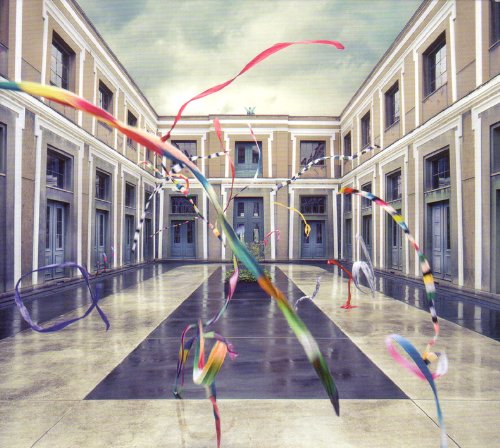
Efterklang
Magic Chairs
Release Date: Feb 23, 2010
Genre(s): Rock, Pop, Experimental
Record label: 4AD
Music Critic Score
How the Music Critic Score works
Album Review: Magic Chairs by Efterklang
Very Good, Based on 11 Critics
Based on rating 9/10
I'll always remember the first time I heard this group, sometime in 2004, eagerly taking home a fresh copy of Tripper after reading some obscure but wildly enthusiastic internet recommendation. And I loved it from the first skittering beats of Swarming to the final chords of Chapter 6. Haunted by an understated ambience though it was, the record didn't sound like anyone else at the time and stood out a mile through its irresistible quality.
Based on rating 8/10
Bands that eschew the traditional guitar / bass / drums / synths line up are often paraded as innovators, or something special. Witness Beirut, or Patrick Wolf, both of whom started off without guitars (although Wolf has since reneged on that), and focused on ukeleles and accordions and other marginalised instruments. It certainly works as a way to draw attention to oneself, as a conscious rejection of the dominant paradigm of the music world.
Based on rating 4/5
Copenhagen experimental orchestral rock band Efterklang go pop on their third album, but don't expect their elegantly arranged off-kilter tunes to crop up on top-40 radio any time soon. They're still far off in left field - even if this is their most conventional album so far - and frankly, we wouldn't have it any other way. [rssbreak] The new emphasis on traditional pop structures gives Magic Chairs a focused feeling that Efterklang's earlier work sometimes lacked.
Based on rating 4/5
Magic Chairs, Efterklang’s majestic new record, reaches for an emotional depth and complexity that is not currently in vogue. It’s artful and emotional, rewarding attention without requiring it. Combining orchestral instrumentation with subtle electronic accents, Magic Chair’s 10 songs veer off unexpectedly into wordless cries, choral verses, and even Memphis soul breakdowns.
Based on rating 3/5
Following collaborations with the Danish National Chamber Orchestra and the Britten Sinfonia, Copenhagen's principal indie-electronica-classical experimentalists have taken a relatively reined-in approach for their third album, and first for 4AD. The orchestras, overdubs, choirs and weird sounds remain, but the classical instrumentation is allied to song structures that are much closer to a conventional indie pop band. Anyone who enjoyed Elbow being backed by the Hallé Orchestra last year will find much to love here.
Based on rating 3.0/5
With Magic Chairs, Efterklang pieces together many of the most successful elements from the indie and alternative music of the last decade (brightly orchestrated numbers, alternating guy/girl vocals, light electronic flourishes), resulting in a 40-minute set that’s uniformly pleasant, if only occasionally splendid. That’s not for lack of trying: The Danish indie troupe has a keen sense of how to build and pace a pop song, with most of the tracks here beginning in quietude before stretching out into more grandiose territory. Both the opening “Modern Drift” and closing “Natural Tune” find the band nailing that formula: The former begins in gentle piano figures, the latter with delicate acoustics, but in both cases it’s the intervention of a stomping, cavernous drumbeat that signals their ascension to orchestral pop altitude.
Based on rating 5.9/10
Even if only for a moment at a time, Efterklang have felt like the grandest pop band in the world. On each of the Danish band's first two albums, they've had flashes of melodrama, majesty, and melody capable of approaching indie's top tier-- the Arcade Fire's masterfully built crescendos, M83's epic electronic accessibility, Sufjan Stevens' pretty, piled-high themes. Efterklang splice those little shots of splendor through Magic Chairs, their third LP and first for 4AD, too.
Based on rating 5.9/10
Echoes in a crowded room If my non-existent Danish and the Internet serve me correctly, “Efterklang” means something like “reverberations” or “remembrances,” and the beautiful duality of that half-translation captures the flavor of this band’s music. With its third album, Efterklang has casually drifted from the more overtly classical structures of its earliest work toward tighter rock songs rendered with the elegance and precision of cut glass. Sprinkled throughout are familiar tones—fans of Sting, Arcade Fire and The National will all find friendly echoes throughout the album.
Opinion: Fantastic
Efterklang's Magic Chairs is what Arcade Fire's Neon Bible would have sounded like if it had been written for the church instead of just recorded in one. Not that this Danish quartet preaches the gospel, but its somber art-pop and disciplined chamber orchestration beckon for stained-glass treatment. The band's third LP scales back and sharpens the electronic textures and cinematic sweep that defined 2007's Parades, and the result is Efterklang's most immediate work.
Opinion: Excellent
A superb record from one of the world’s most uniquely-minded bands. Mike Diver 2010 Efterklang’s third long-player opens with a song so exquisite, so alluring of textural depth and enveloping of divine ambience, that all else fades away. Tunnel vision of the senses, peripheries blurred and spiralled into a Turner-style canvas-drama on the cornea.
Opinion: Excellent
With any ability comes the urge to explore it. For Efterklang, this naturally meant being complex and virtuosic, culminating with the massive orchestrations on 2007’s impressive but overblown Parades. After gaining massive popularity in their home base of Denmark and touring the hell out of Parades with an extended lineup, they seem to have concluded that those explorations were complete and that it was time to see what other abilities they had.

